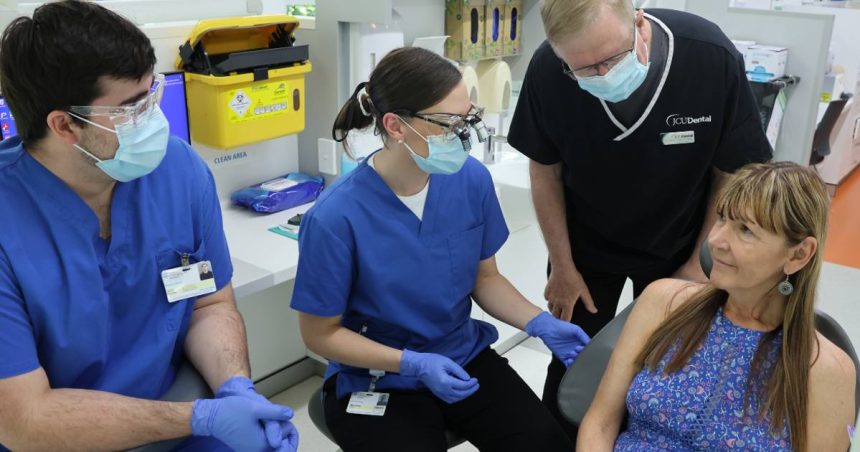James Cook University’s Dental Clinics have marked a milestone after treating more than 80,000 northern Queenslanders.
JCU Director of Clinical Studies Professor John Abbott says he and his team are thrilled to have provided the vital service in Cairns and Townsville.
The Cairns clinic first opened its doors at JCU’s Nguma-bada (Smithfield) campus in 2012, with the majority of patients being pensioners and concession card holders.
“This achievement is a remarkable milestone,” Prof Abbott says.
“It’s a testament to the clinic’s commitment to providing high-quality dental care and its dedication to serving the community and providing clinical training to JCU’s dental students. This milestone also highlights the importance of access to affordable and specialised healthcare services, particularly in regional areas where patients may have limited access to dental care.”
Benefits for students and community
Professor Abbott says dental students continue to benefit enormously from the clinics and receive hands-on experience in a real-world setting, with the clinics for far producing 760 dentistry graduates – each with more than 2000 hours of clinical practice.
“The clinic allows them to develop a deeper understanding of dental procedures, patient communication and teamwork,” he says.
“Student feedback has been overwhelmingly positive, with many praising the clinic’s learning environment, which allows them to make mistakes and learn from them in a safe and supportive atmosphere.
“Some students have even reported that the clinic experience was certainly instrumental in securing their first job as a dentist after graduation.”
Fourth year dentistry students Lily Hunt and Meghan Mannix say their experiences in the clinic have been a highlight of their training with JCU.
“Training at the JCU Dental Clinic is an unbelievable opportunity,” Hunt says.
“We have some super lovely patients, and it makes a world of difference in developing your social skills as well as giving you that real-life experience. The rapport with patients is a really big part of the experience for me.”
Retired pensioner and Yorkeys Knob local Judy Carrol has received treatment at the clinic since it first opened.
“The students I’ve had have been fabulous. I’ve seen quite a few of them over the years as I’ve had so many appointments,” Carrol says.
“As a pensioner, it is such an important service for me; any way to save a bit of money is very good. I get nervous about going to the dentist, but I’ve always been put at ease when I go to the JCU clinic. The view from the dental chair that looks out to the rainforest certainly helps to lower the blood pressure.”

Providing vital treatment to people in need
Professor Abbott says the clinic is instrumental in providing vital dental care to pensioners and concession card holders who otherwise would not have been able to afford or access treatment for their dental problems.
“The clinic’s commitment to providing free general dental treatment for concession card holders has made it possible for these patients to receive the care they need, regardless of their financial situation,” he says.
“The clinic’s services have been especially important for Cairns and its surrounds where access to dental care may be limited.
“It is crucial that in northern Queensland, JCU Dental continues to offer services to pensioners and concession card holders because they are a vulnerable population who often face significant barriers to accessing dental care.”









